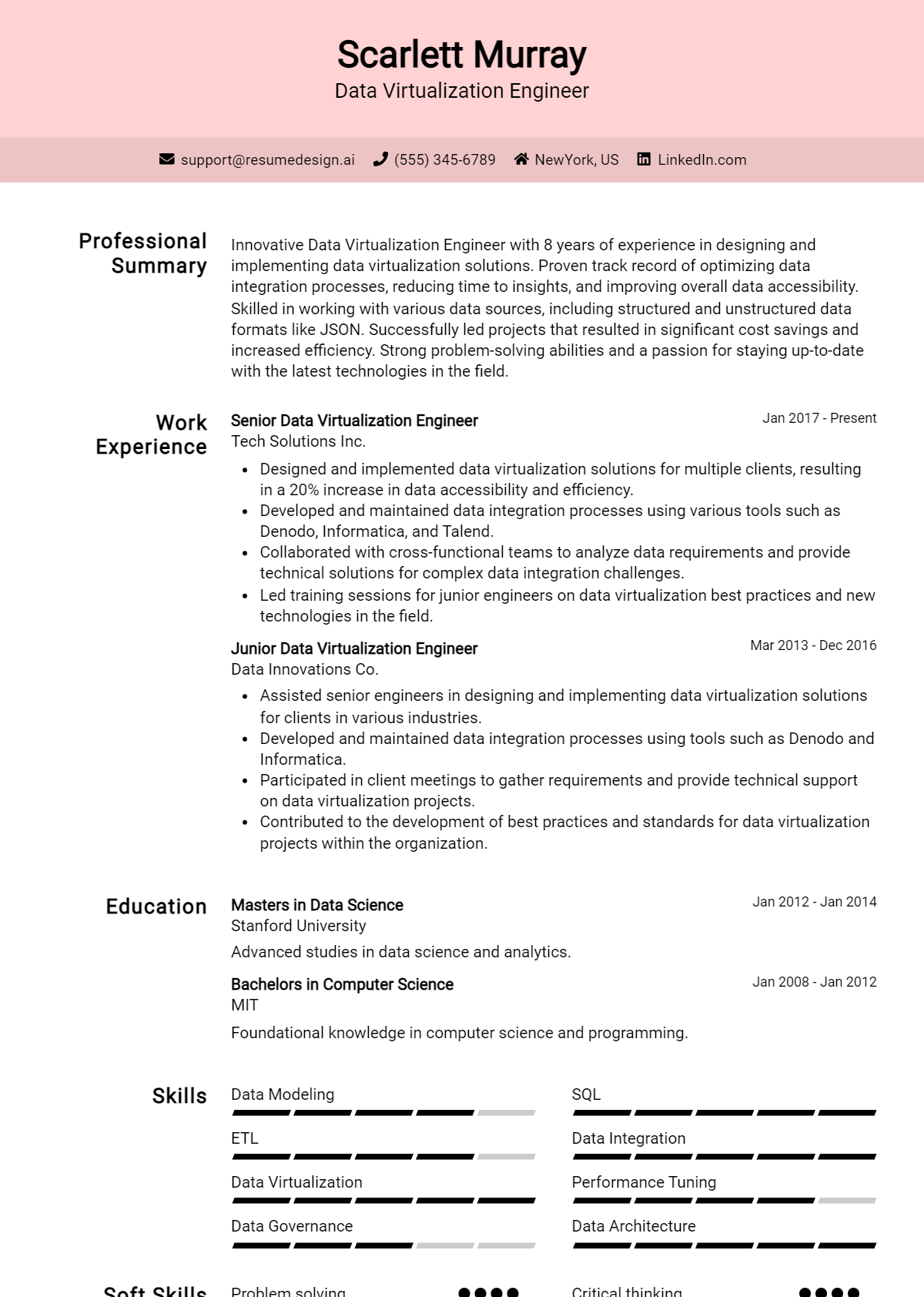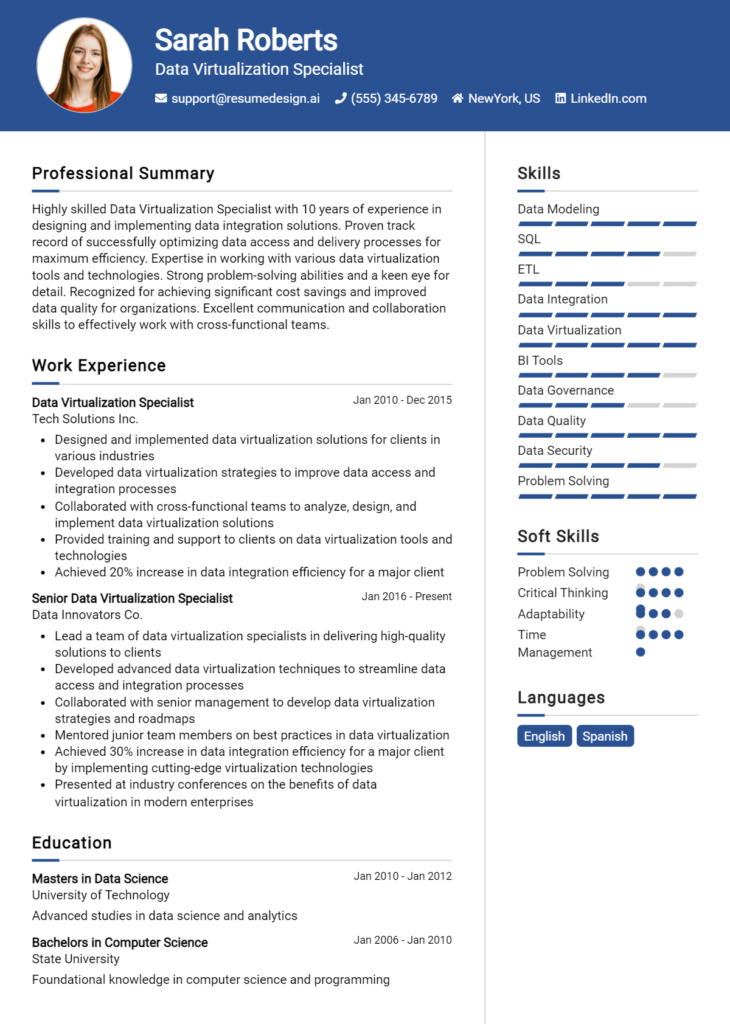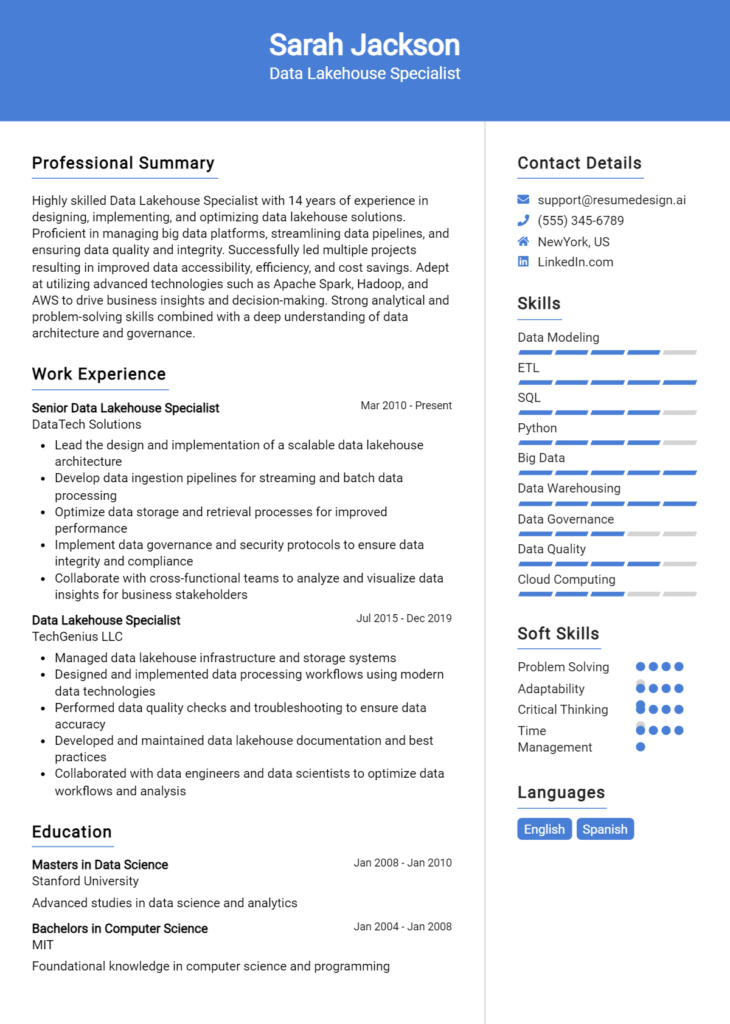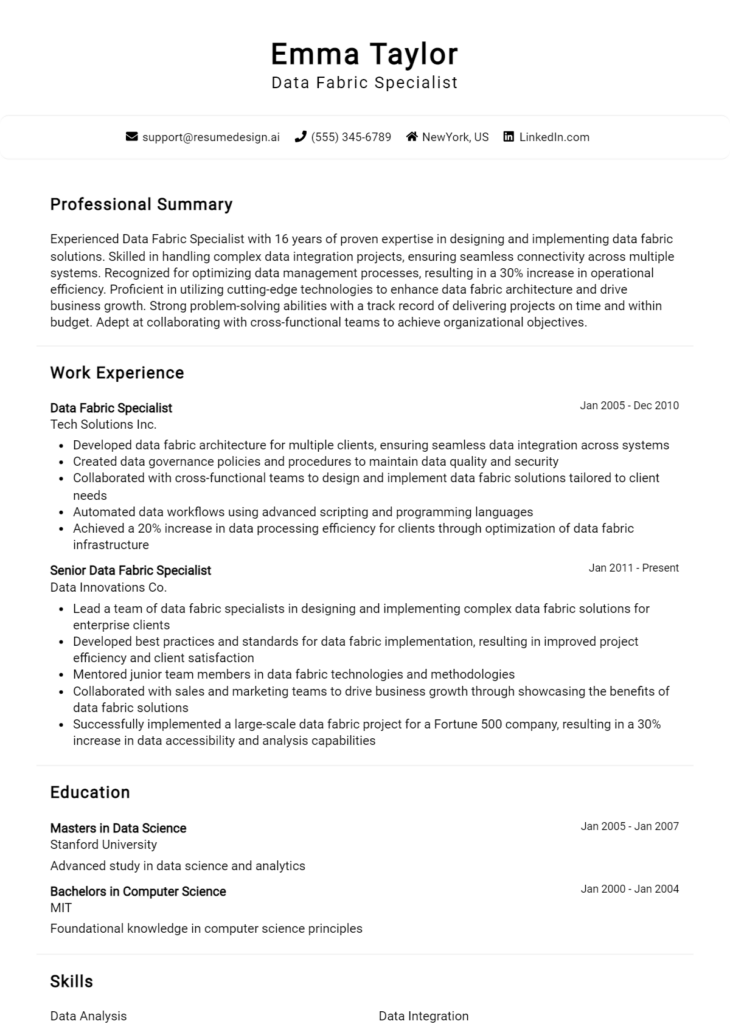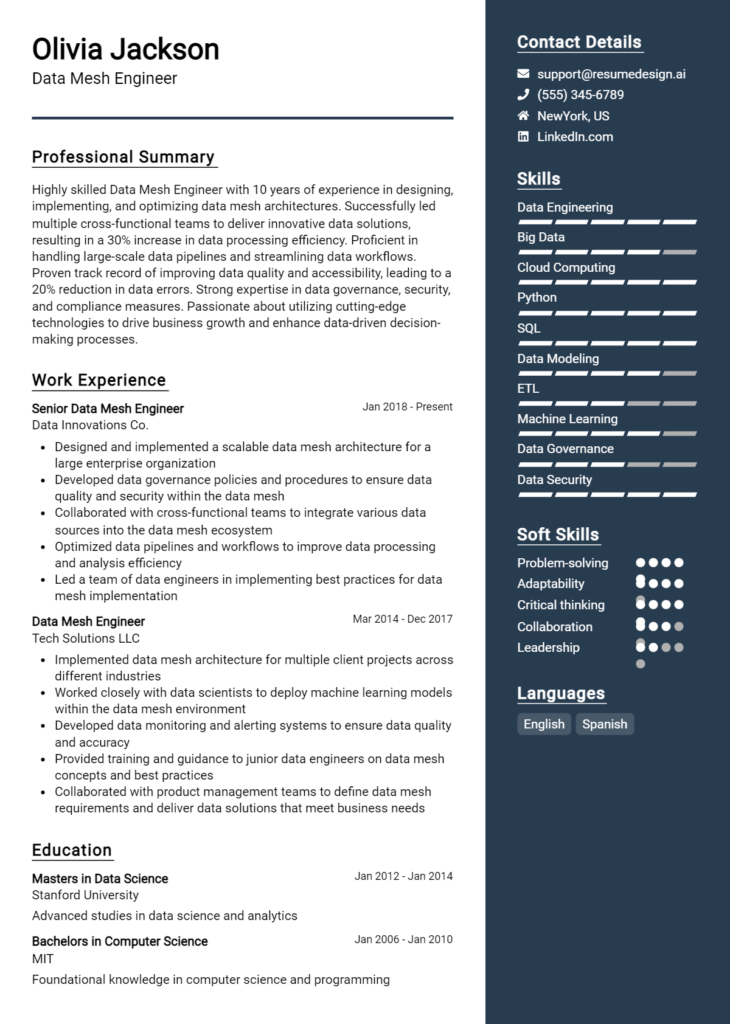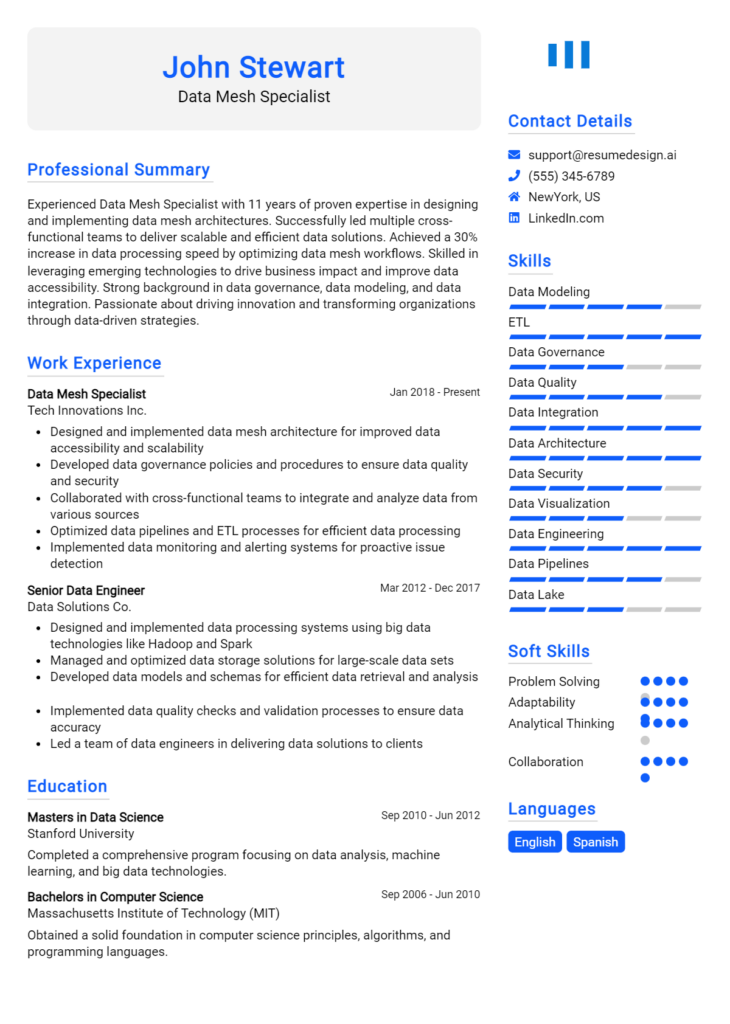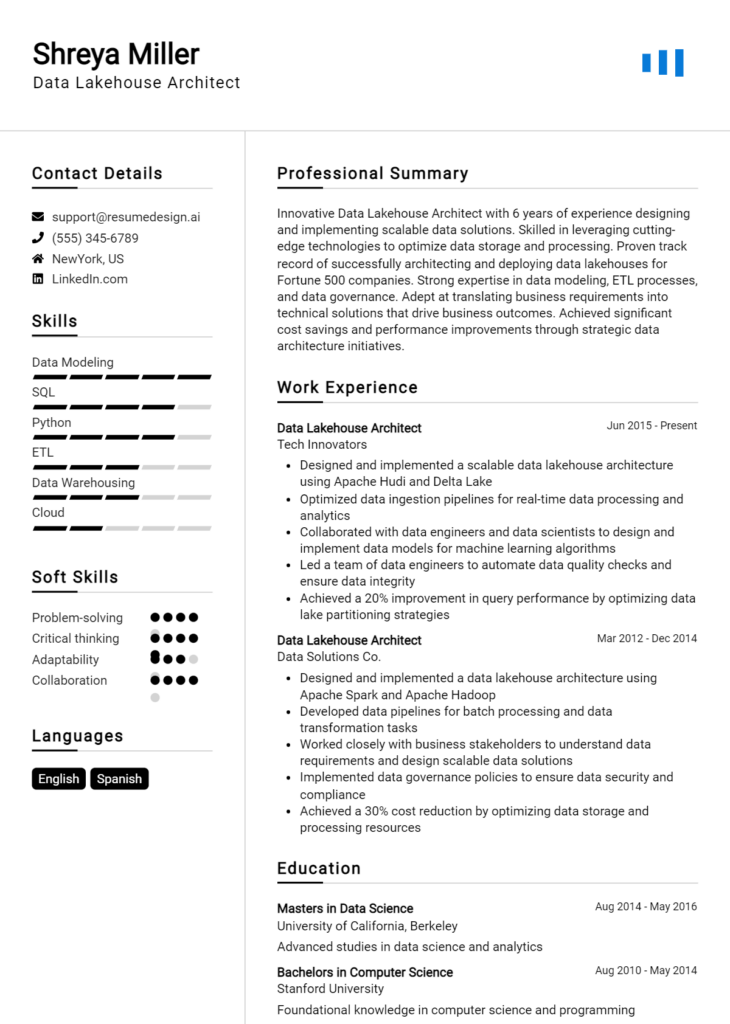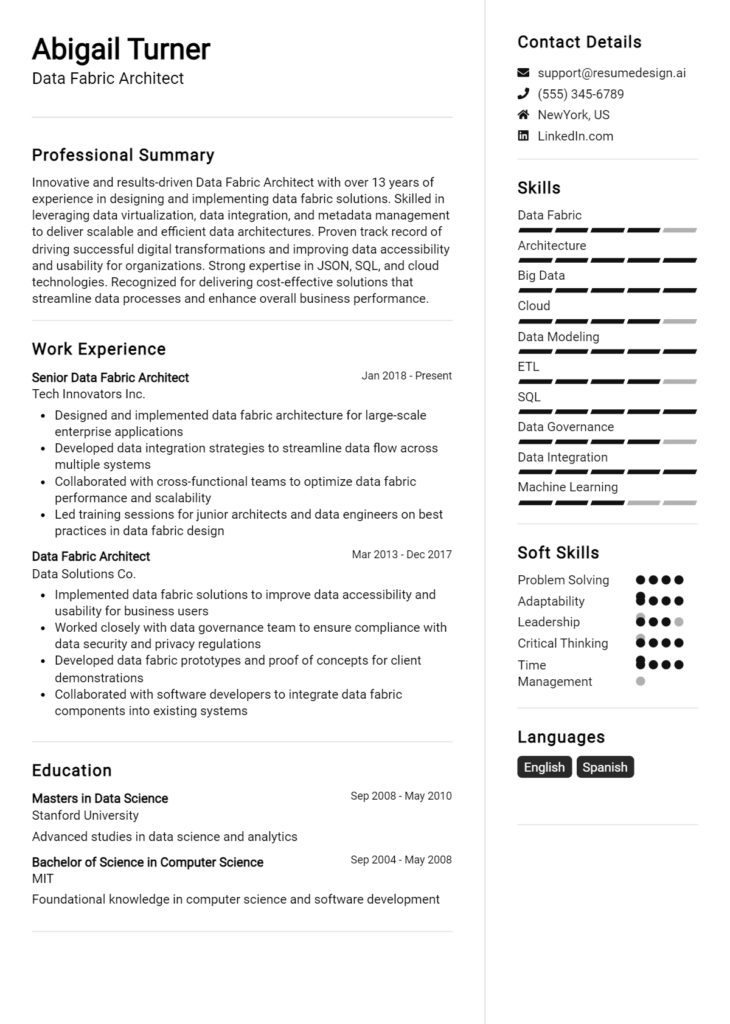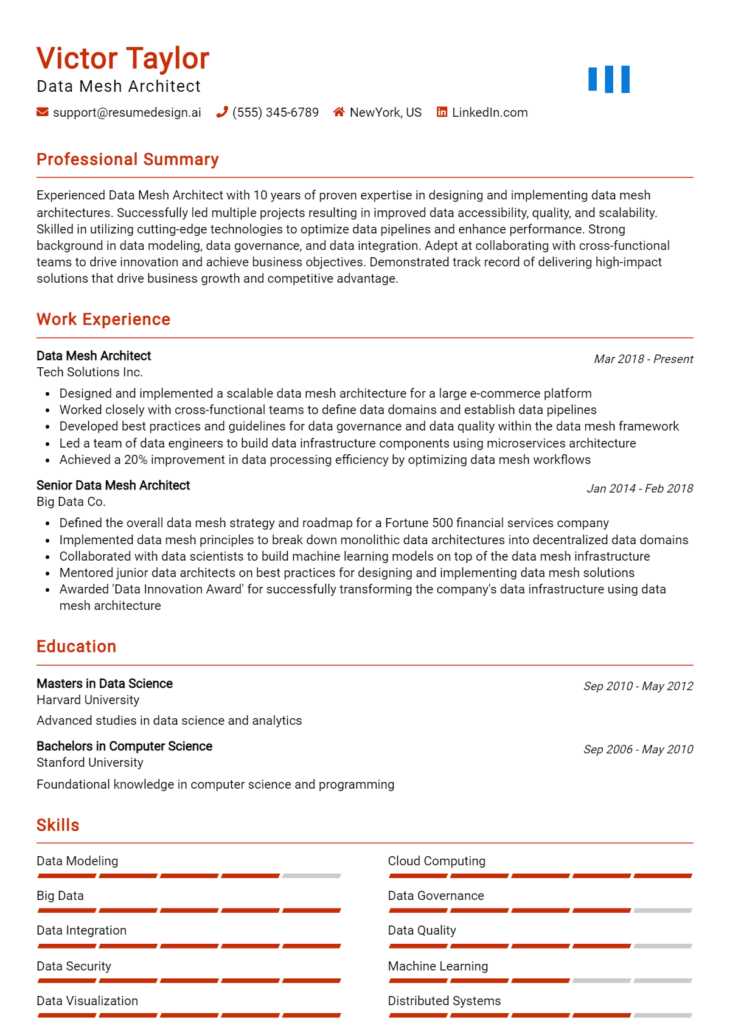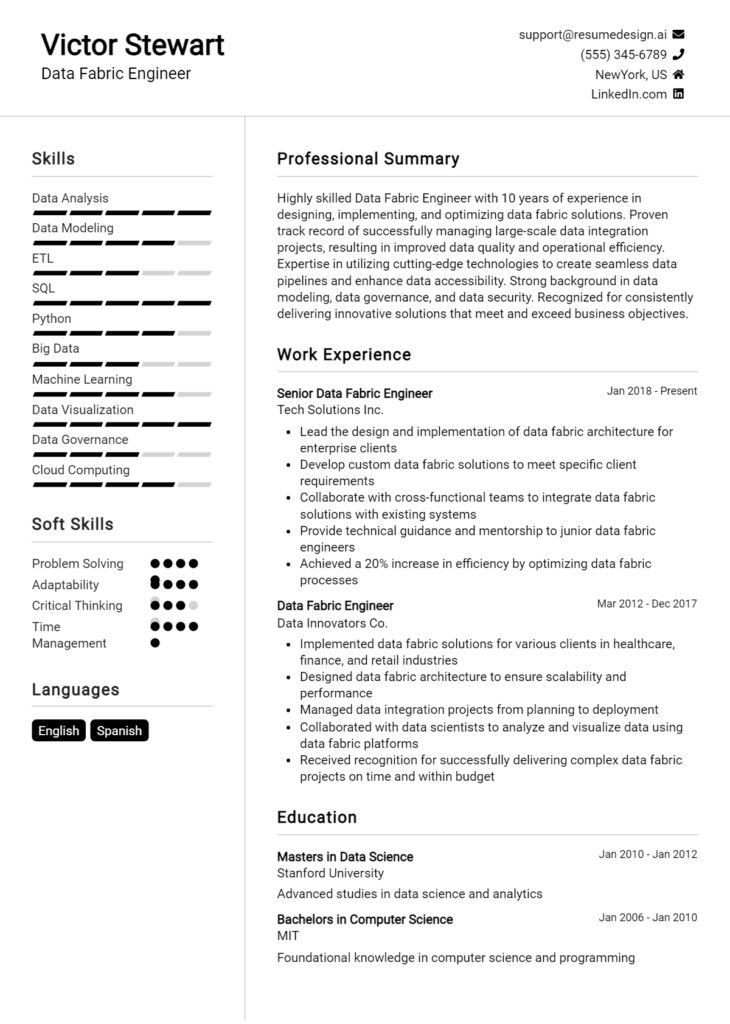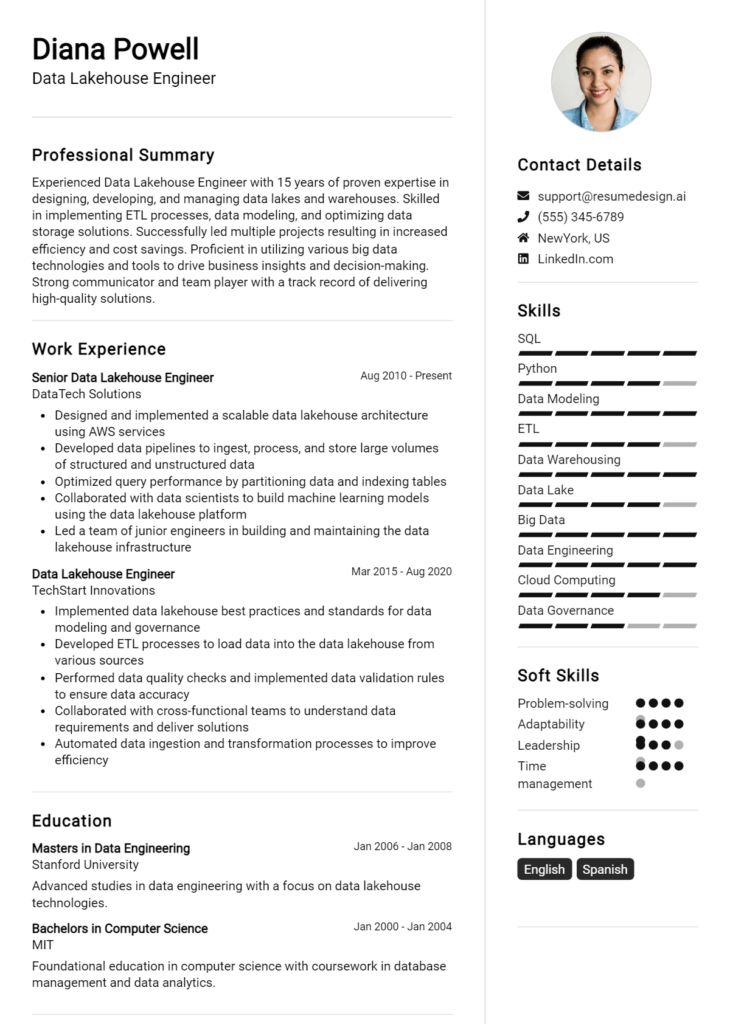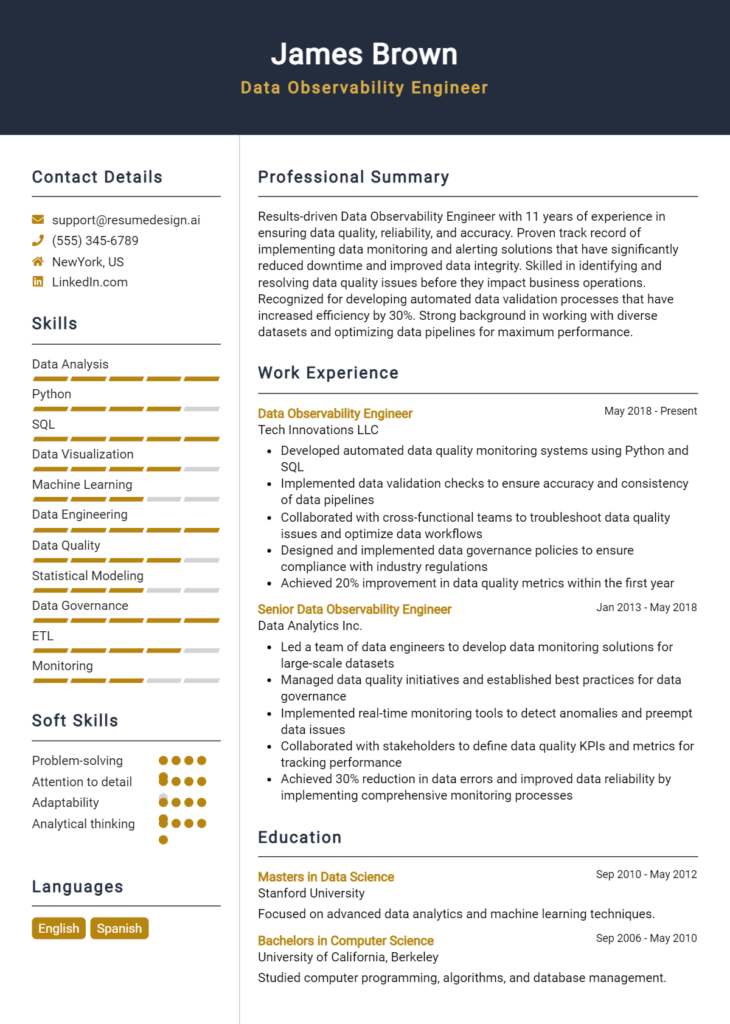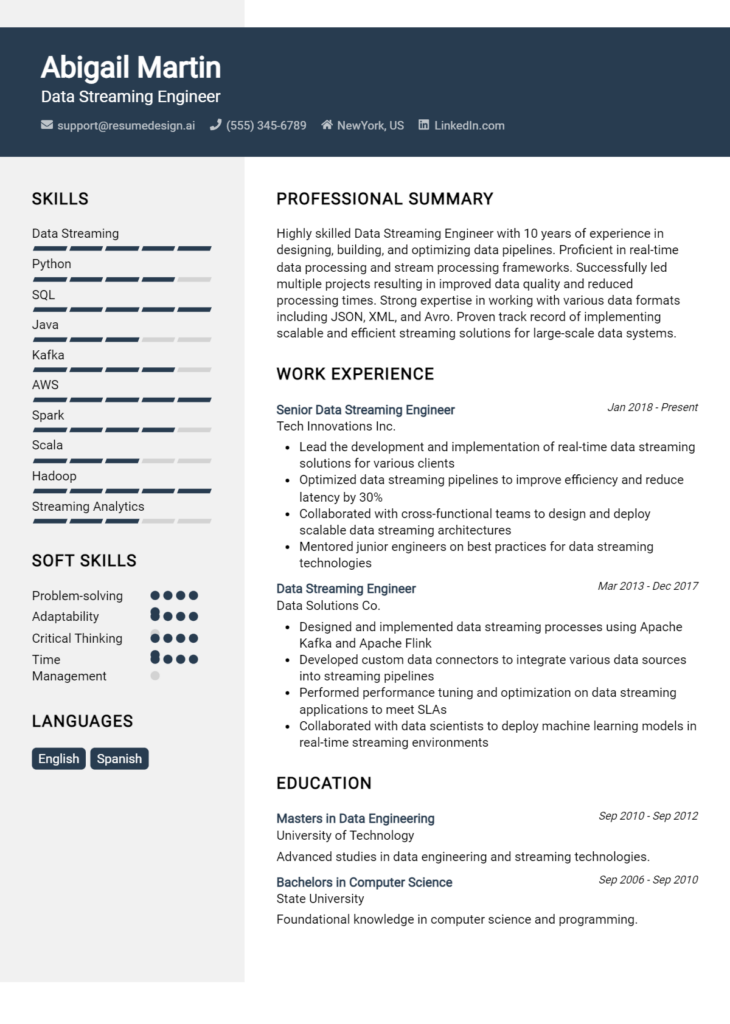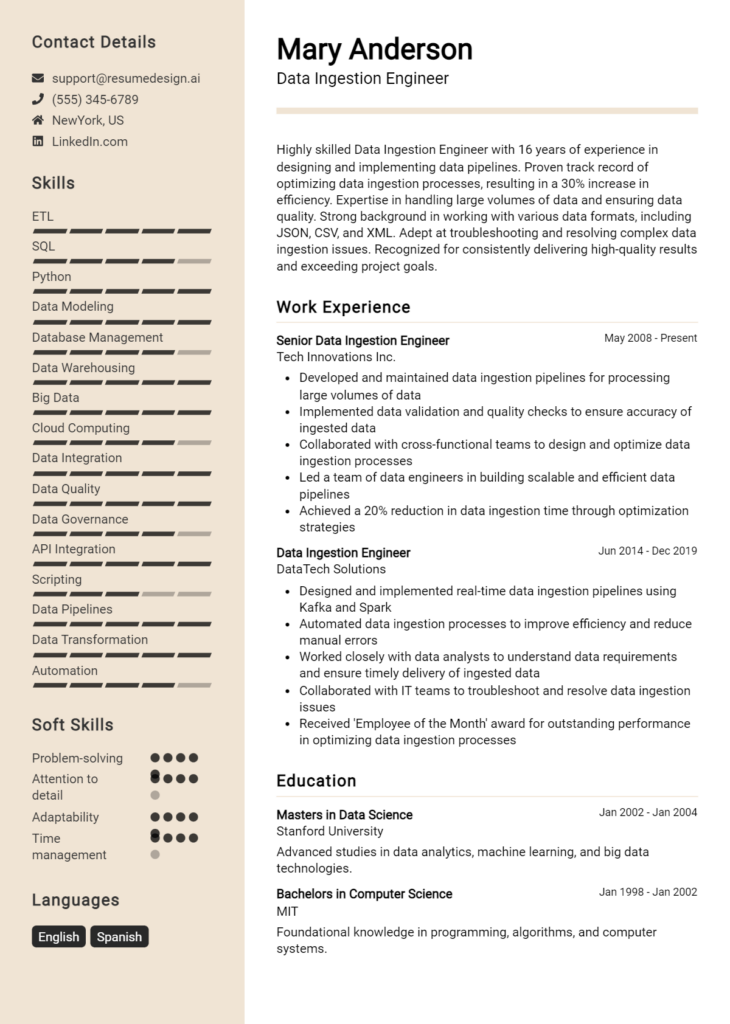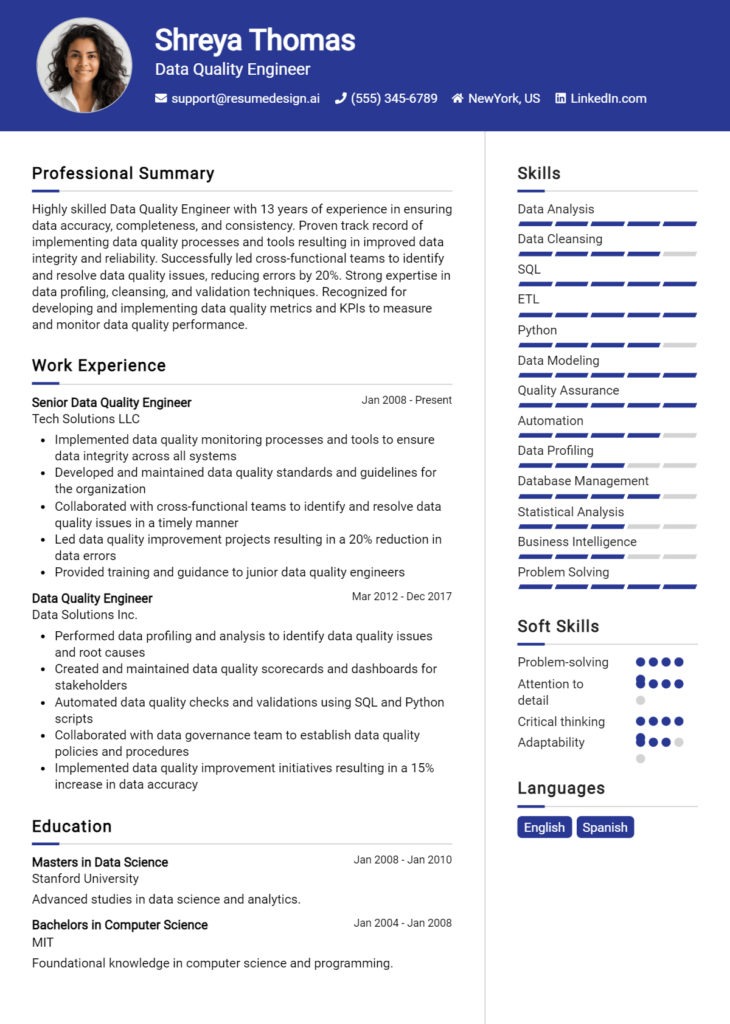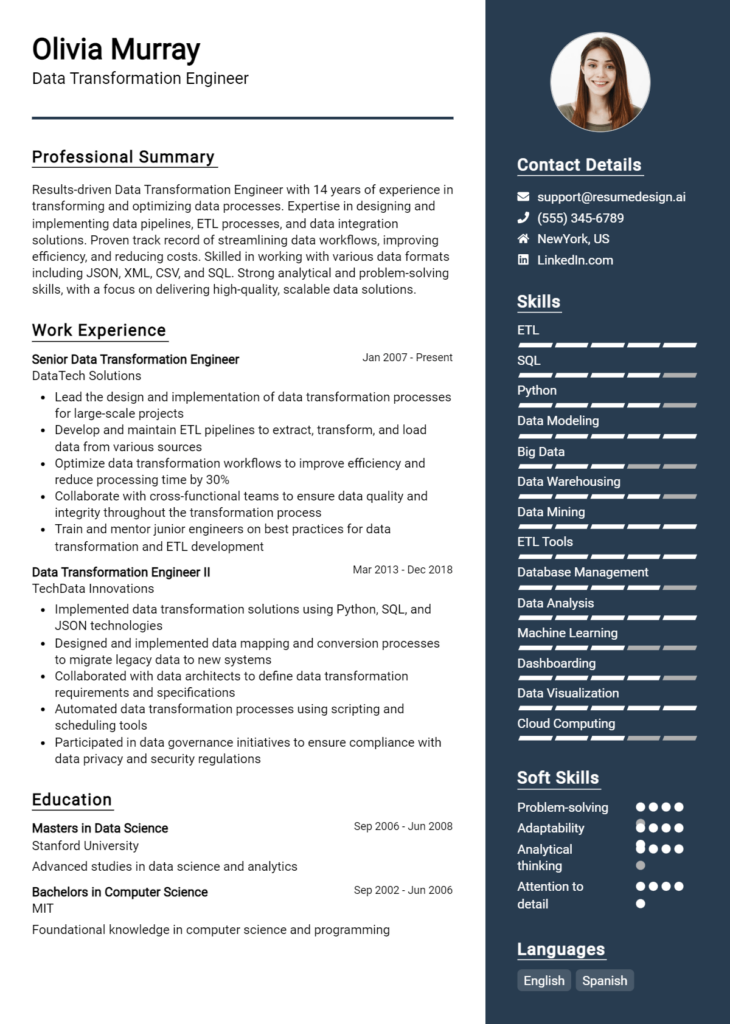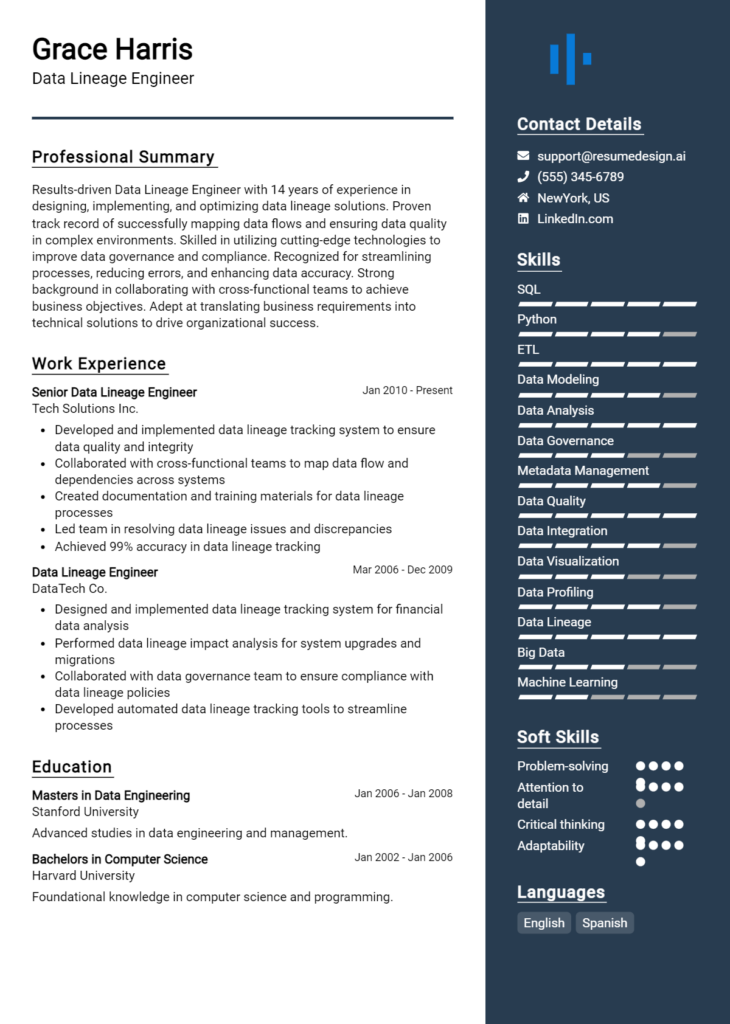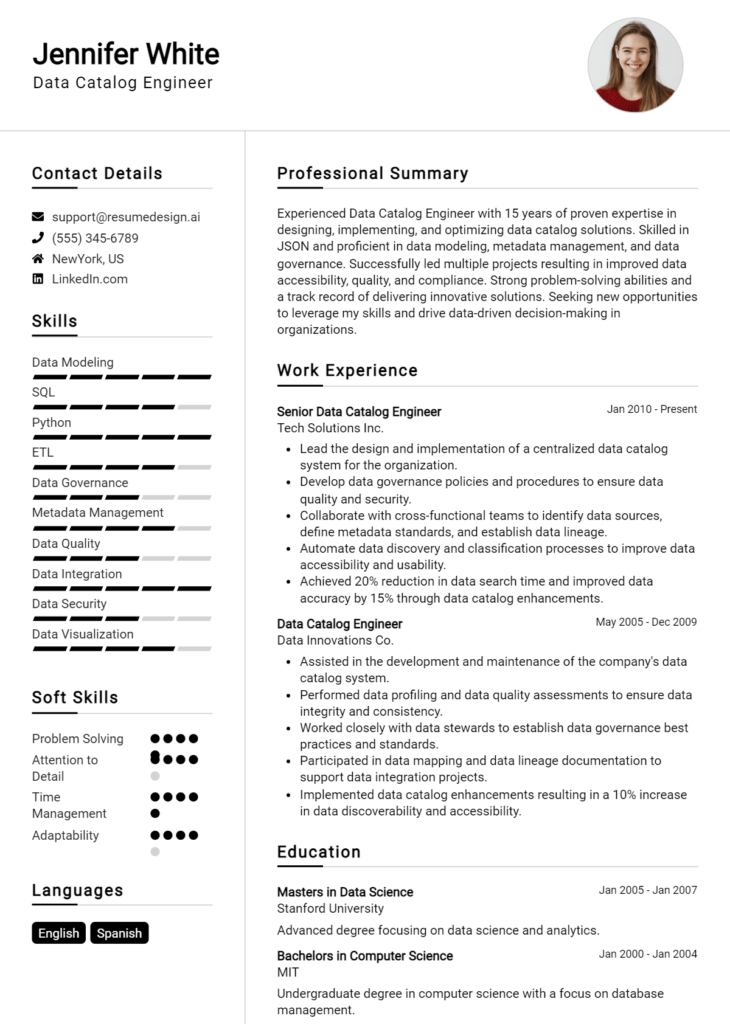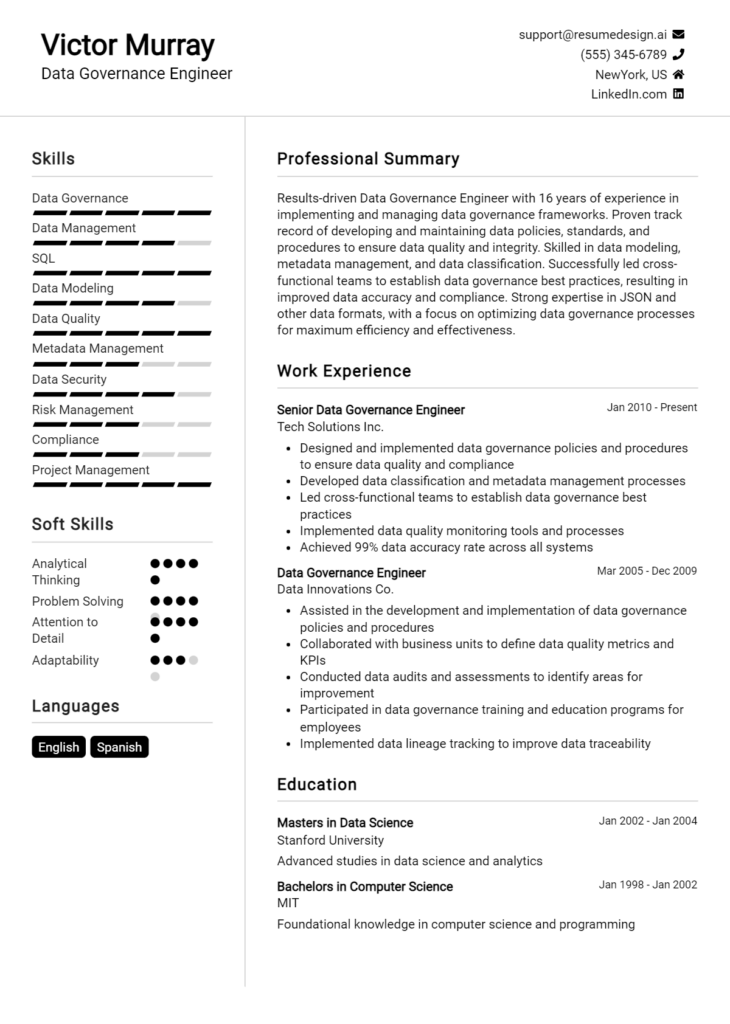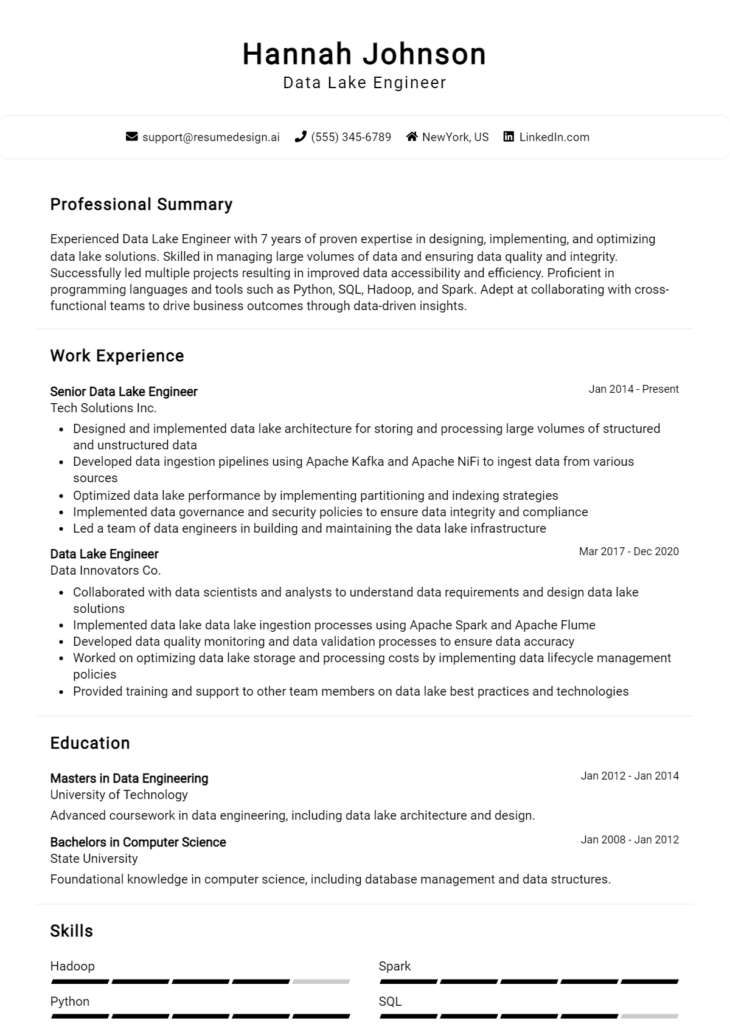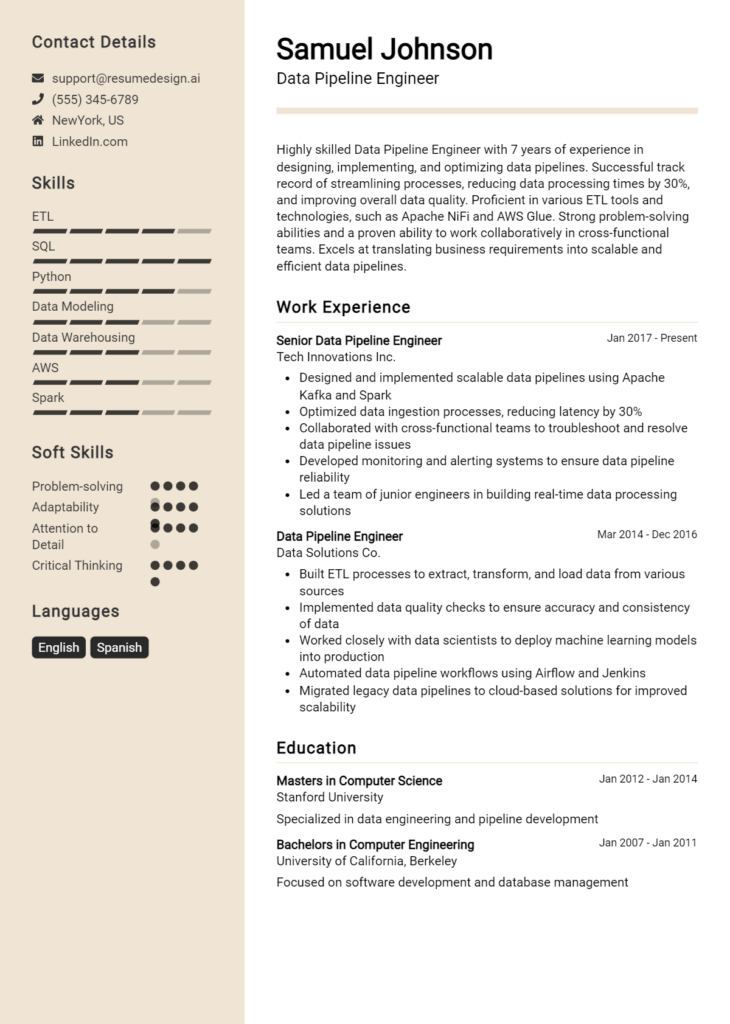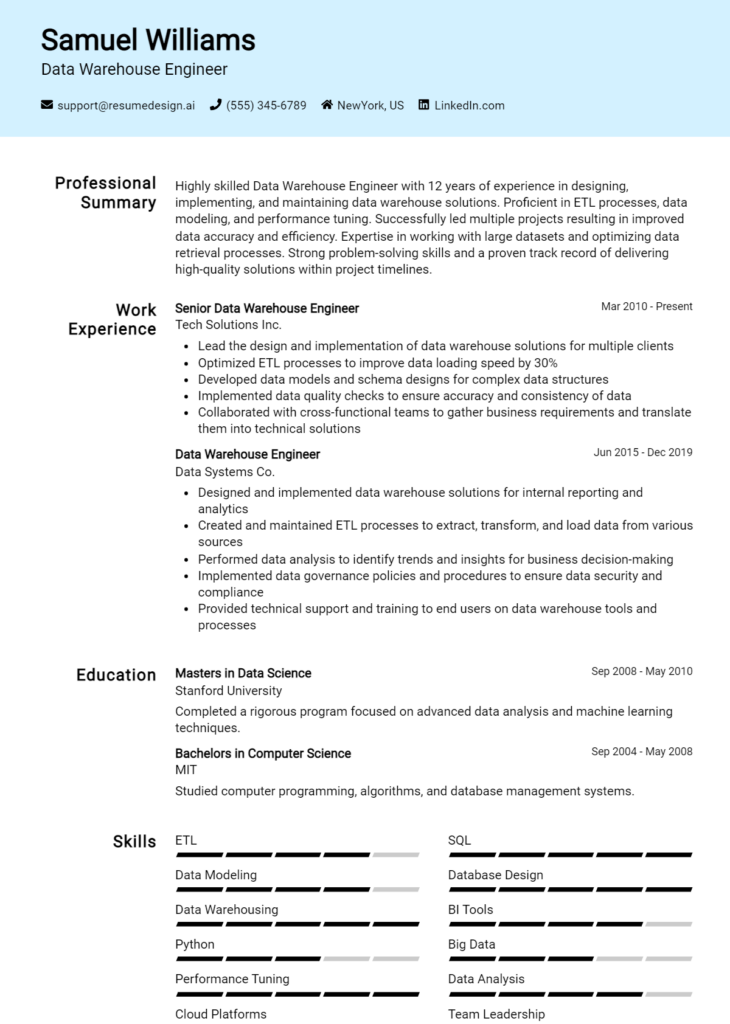Data Virtualization Engineer Core Responsibilities
A Data Virtualization Engineer plays a pivotal role in bridging various departments by enabling seamless access to data across disparate sources. This professional is responsible for designing and implementing data virtualization solutions, ensuring data quality, and optimizing data integration processes. Essential skills include technical expertise in data modeling, operational knowledge of data governance, and strong problem-solving abilities. These competencies are crucial for aligning data initiatives with organizational goals, and a well-structured resume can effectively highlight these qualifications, enhancing career opportunities.
Common Responsibilities Listed on Data Virtualization Engineer Resume
- Design and implement data virtualization solutions to support business intelligence.
- Collaborate with cross-functional teams to understand data requirements.
- Optimize data access and integration processes for improved performance.
- Ensure data quality and consistency across multiple data sources.
- Develop and maintain data models for effective data retrieval.
- Monitor and troubleshoot data virtualization performance issues.
- Implement data governance and security protocols.
- Provide training and support to end-users on data virtualization tools.
- Document data virtualization processes and best practices.
- Stay updated with industry trends and advancements in data virtualization technologies.
High-Level Resume Tips for Data Virtualization Engineer Professionals
In the competitive landscape of data management, a well-crafted resume is essential for Data Virtualization Engineer professionals seeking to make a mark in their careers. Your resume serves as your first impression, often determining whether you advance to the next stage of the hiring process. It must effectively showcase your technical skills, relevant experiences, and noteworthy achievements in a manner that resonates with potential employers. This guide will provide practical and actionable resume tips specifically tailored for Data Virtualization Engineer professionals, ensuring that your application stands out in a crowded field.
Top Resume Tips for Data Virtualization Engineer Professionals
- Tailor your resume to match the job description, emphasizing keywords and phrases that reflect the specific requirements of the position.
- Highlight relevant experience in data virtualization projects, including specific tools and technologies used (e.g., Denodo, Cisco, Informatica).
- Quantify your achievements by using metrics to demonstrate the impact of your work, such as improvements in data access speed or reductions in data processing time.
- Showcase industry-specific skills, such as data modeling, ETL processes, and integration techniques, that are pertinent to data virtualization.
- Include certifications and trainings related to data virtualization technologies, which can add credibility and demonstrate your commitment to professional development.
- Use action verbs to describe your experience, such as "implemented," "designed," and "optimized," to convey a sense of proactivity and achievement.
- Incorporate a summary statement that outlines your key qualifications and career goals, tailored to the data virtualization field.
- Keep your resume concise and focused; ideally, limit it to one page unless you have extensive experience that necessitates a two-page format.
- Proofread your resume to eliminate any grammatical errors or typos, which can undermine your professionalism.
By implementing these tips, you can significantly enhance the effectiveness of your resume, increasing your chances of landing a job in the Data Virtualization Engineer field. A polished and targeted resume not only highlights your qualifications but also demonstrates your understanding of the industry, making you a more attractive candidate to potential employers.
Why Resume Headlines & Titles are Important for Data Virtualization Engineer
In the competitive landscape of data virtualization engineering, a well-crafted resume headline or title serves as the first impression a hiring manager receives from a candidate. It acts as a powerful tool to immediately capture attention and convey a candidate's key qualifications in a succinct and impactful manner. A strong headline not only summarizes essential skills and experiences but also aligns closely with the specific job being applied for, ensuring relevance and focus. By being concise and targeted, the headline can set the tone for the entire resume, making it crucial for candidates in this specialized field to invest time in creating an effective headline that resonates with potential employers.
Best Practices for Crafting Resume Headlines for Data Virtualization Engineer
- Keep it concise, ideally within 10 words.
- Use role-specific terminology that aligns with the job description.
- Highlight key skills or certifications relevant to data virtualization.
- Incorporate measurable achievements or notable experiences, if applicable.
- Avoid generic phrases; be specific about your expertise.
- Use action-oriented language to convey proactivity.
- Tailor the headline for each application to reflect the specific job requirements.
- Ensure it reflects your professional brand and unique value proposition.
Example Resume Headlines for Data Virtualization Engineer
Strong Resume Headlines
Data Virtualization Engineer with 5+ Years of Experience in ETL and Data Integration
Certified Data Virtualization Specialist | Proven Track Record in Streamlining Data Access
Expert in Data Virtualization Solutions for Cloud and On-Premise Environments
Innovative Data Engineer | Enhancing Business Intelligence through Virtualization Techniques
Weak Resume Headlines
Data Engineer
Experienced Professional Seeking Opportunities
The strong headlines are effective because they communicate specific areas of expertise and accomplishments that are directly relevant to the role of a Data Virtualization Engineer. They use industry-specific language and highlight unique skills or certifications, which can resonate with hiring managers looking for candidates who can meet their needs. In contrast, the weak headlines fail to impress due to their vagueness and lack of detail, making it difficult for hiring managers to gauge the candidate's qualifications or relevance to the position. By avoiding generic titles and instead focusing on specific skills and experiences, candidates can enhance their chances of standing out in a crowded job market.
Writing an Exceptional Data Virtualization Engineer Resume Summary
A resume summary is a crucial component for a Data Virtualization Engineer as it serves as the first impression for hiring managers. This brief but powerful section allows candidates to highlight their most relevant skills, experiences, and accomplishments, offering a snapshot of their professional capabilities. An exceptional summary should be concise yet impactful, tailored specifically to the job being applied for, ensuring it captures the attention of recruiters and sets the tone for the rest of the resume.
Best Practices for Writing a Data Virtualization Engineer Resume Summary
- Quantify Achievements: Use numbers and metrics to illustrate the impact of your work, such as improvements in data retrieval times or cost savings.
- Focus on Relevant Skills: Highlight technical skills essential for data virtualization, such as proficiency in ETL tools, data integration techniques, and data modeling.
- Tailor the Summary: Customize the summary to align with the specific job description, emphasizing relevant experiences and skills that match the employer's needs.
- Keep it Concise: Limit the summary to 2-4 sentences; it should be brief enough to maintain interest while compelling enough to spark curiosity.
- Showcase Accomplishments: Mention notable projects or successful implementations that illustrate your expertise and effectiveness in the role.
- Use Action Verbs: Start sentences with strong action verbs to convey your contributions assertively and dynamically.
- Maintain Professional Tone: Ensure the language is professional and avoids jargon that may not be recognized outside specific contexts.
- Highlight Problem-Solving Skills: Emphasize your ability to tackle challenges in data virtualization, showcasing innovative solutions you have implemented.
Example Data Virtualization Engineer Resume Summaries
Strong Resume Summaries
Results-driven Data Virtualization Engineer with over 7 years of experience in developing robust data integration solutions. Successfully reduced data retrieval times by 30% through the implementation of optimized ETL processes and advanced virtualization techniques.
Skilled Data Virtualization Engineer specializing in cloud-based data solutions, having led a project that integrated data from 10+ sources, improving data accuracy by 25% and overall system efficiency.
Innovative Data Virtualization Engineer with a proven track record of enhancing data accessibility across organizations. Spearheaded a virtualization initiative that resulted in a 40% reduction in data silos, enabling real-time analytics and reporting.
Weak Resume Summaries
Experienced Data Virtualization Engineer looking for a challenging position in a reputable company.
Proficient in data management and visualization tools with a history of working in technology.
The strong resume summaries are effective because they provide specific details about achievements, quantify results, and directly relate to the role of a Data Virtualization Engineer. They demonstrate not only the candidate's skills but also the real-world impact of their work. In contrast, the weak summaries lack specificity and measurable outcomes, making them generic and unmemorable, which can lead to being overlooked by hiring managers.
Work Experience Section for Data Virtualization Engineer Resume
The work experience section is a critical component of a Data Virtualization Engineer resume, as it serves as a platform for candidates to demonstrate their technical expertise, leadership capabilities, and commitment to delivering high-quality data solutions. By effectively detailing past roles, responsibilities, and achievements, candidates can illustrate their ability to manage teams, optimize data workflows, and implement innovative virtualization strategies. It is essential to quantify achievements where possible, such as cost savings or performance improvements, and to align the experiences with industry standards to stand out in a competitive job market.
Best Practices for Data Virtualization Engineer Work Experience
- Highlight technical skills relevant to data virtualization technologies and tools.
- Quantify achievements with specific metrics such as time saved, costs reduced, or performance improvements.
- Emphasize collaborative projects that showcase teamwork and cross-departmental cooperation.
- Detail leadership roles and responsibilities to demonstrate management capabilities.
- Use action verbs to convey a sense of proactivity and impact.
- Tailor experiences to align with the job description and industry standards.
- Include challenges faced and how they were overcome to demonstrate problem-solving skills.
- Keep descriptions concise and focused on results to maintain clarity and impact.
Example Work Experiences for Data Virtualization Engineer
Strong Experiences
- Led a team of 5 engineers in implementing a data virtualization solution that reduced data access time by 40%, enhancing reporting efficiency for key stakeholders.
- Designed and deployed a central data virtualization platform that aggregated data from 10 disparate sources, resulting in a 25% reduction in operational costs.
- Collaborated with cross-functional teams to integrate real-time data feeds, improving data accuracy and reporting speed by 30%.
- Managed a project that streamlined data migration processes, decreasing project lifecycle duration by 50% and significantly improving customer satisfaction.
Weak Experiences
- Worked on various data projects with some success.
- Assisted in data management tasks under supervision.
- Involved in team meetings to discuss data-related issues.
- Helped with documentation and other support tasks.
The examples provided are considered strong or weak based on their clarity, specificity, and impact. The strong experiences clearly illustrate quantifiable outcomes, demonstrate leadership, and highlight effective collaboration, making them compelling to potential employers. In contrast, the weak experiences lack detail and do not convey significant achievements or responsibilities, which diminishes their effectiveness in showcasing the candidate's qualifications.
Education and Certifications Section for Data Virtualization Engineer Resume
The education and certifications section of a Data Virtualization Engineer resume plays a critical role in establishing the candidate’s qualifications and expertise in the field. This section not only highlights the candidate's academic background but also emphasizes industry-relevant certifications and their commitment to continuous learning. By providing pertinent coursework, certifications, and specialized training, candidates can significantly enhance their credibility and demonstrate alignment with the specific requirements of the job role. This section serves as a powerful tool to convey a solid foundation in data management concepts, tools, and technologies essential for success as a Data Virtualization Engineer.
Best Practices for Data Virtualization Engineer Education and Certifications
- Include only relevant degrees and certifications that pertain directly to data virtualization and data management.
- List your educational achievements in reverse chronological order, starting with the most recent.
- Highlight any specialized training or workshops that focus on data virtualization tools or methodologies.
- Incorporate relevant coursework that showcases your knowledge of data integration, data warehousing, or similar subjects.
- Emphasize advanced or industry-recognized credentials, such as certifications from reputable organizations in data management and virtualization.
- Provide details of certifications, including the issuing organization and the date obtained, to demonstrate current knowledge.
- Consider including online courses or boot camps that may not lead to formal certification but are relevant to the role.
- Keep descriptions concise and focused on how your education and certifications relate to the Data Virtualization Engineer position.
Example Education and Certifications for Data Virtualization Engineer
Strong Examples
- Master of Science in Computer Science, specializing in Data Management - University of XYZ, 2022
- Certified Data Management Professional (CDMP) - Data Management Association, 2023
- Relevant Coursework: Data Warehousing, Data Modeling, and Data Virtualization Techniques
- Advanced Training in Denodo Data Virtualization Platform - Denodo Technologies, 2023
Weak Examples
- Bachelor of Arts in English Literature - University of ABC, 2010
- Certification in Basic Computer Skills - Online Course, 2015
- High School Diploma - XYZ High School, 2008
- Certification in Microsoft Office Suite - 2016
The examples provided highlight the distinction between strong and weak educational qualifications and certifications. Strong examples are directly aligned with the responsibilities of a Data Virtualization Engineer, showcasing advanced degrees and relevant certifications that indicate a robust understanding of data management. In contrast, weak examples demonstrate a lack of relevance to the field, featuring outdated or unrelated educational backgrounds that fail to establish the candidate's expertise in data virtualization. This clear differentiation helps employers quickly identify candidates who are well-prepared for the role.
Top Skills & Keywords for Data Virtualization Engineer Resume
In the competitive field of data virtualization, a well-crafted resume is essential for showcasing your capabilities as a Data Virtualization Engineer. Highlighting the right skills is crucial, as they provide potential employers with insight into your technical proficiency and soft skills necessary for success in this role. A strong resume should effectively communicate your ability to integrate, manage, and optimize data from various sources, as well as your interpersonal skills that facilitate collaboration within teams. This balance of hard and soft skills is vital for standing out in a crowded job market. For more insights on essential skills and showcasing your work experience, continue reading.
Top Hard & Soft Skills for Data Virtualization Engineer
Soft Skills
- Analytical Thinking
- Problem-Solving
- Communication Skills
- Team Collaboration
- Adaptability
- Attention to Detail
- Time Management
- Critical Thinking
- Creativity
- Stakeholder Management
Hard Skills
- Data Integration Techniques
- ETL (Extract, Transform, Load) Processes
- SQL and NoSQL Databases
- Data Modeling
- API Management
- Data Governance and Security
- Virtualization Tools (e.g., Denodo, Informatica)
- Cloud Platforms (e.g., AWS, Azure)
- Performance Tuning and Optimization
- Scripting Languages (e.g., Python, Shell Scripting)
Stand Out with a Winning Data Virtualization Engineer Cover Letter
As a dedicated and detail-oriented Data Virtualization Engineer with over five years of experience in designing and implementing data integration solutions, I am excited to apply for the position at your esteemed organization. My expertise in creating seamless data access through virtualization technologies, combined with my strong analytical skills, positions me well to contribute effectively to your data management strategies. I am particularly drawn to your company's commitment to leveraging innovative solutions to drive data-driven decision-making, and I believe my background aligns perfectly with your goals.
In my previous role at XYZ Corporation, I successfully led a project to implement a data virtualization platform that reduced query response times by 40% and improved data accessibility for cross-functional teams. I collaborated closely with data architects and business analysts to identify key data sources and design a comprehensive data model that met the diverse needs of stakeholders. My technical proficiency with tools such as Denodo and Apache Drill, along with my knowledge of SQL and data modeling concepts, has enabled me to deliver high-quality solutions that enhance operational efficiency.
I am also passionate about keeping abreast of the latest trends in data virtualization and integration. By continuously honing my skills and exploring emerging technologies, I have been able to propose innovative solutions that not only meet immediate project requirements but also align with long-term strategic objectives. I am eager to bring this proactive approach to your team and contribute to the development of robust data ecosystems that empower your organization to leverage its data assets effectively.
I welcome the opportunity to discuss how my skills and experiences can contribute to the success of your data initiatives. Thank you for considering my application; I look forward to the possibility of discussing my candidacy further.
Common Mistakes to Avoid in a Data Virtualization Engineer Resume
When crafting a resume for a Data Virtualization Engineer position, it's crucial to avoid common pitfalls that can undermine your qualifications and expertise. A well-structured resume not only highlights your technical skills but also showcases your ability to solve complex data challenges through virtualization. Here are some prevalent mistakes to steer clear of to ensure your resume stands out in the competitive job market:
Lack of Relevant Keywords: Failing to include industry-specific keywords may cause your resume to be overlooked by Applicant Tracking Systems (ATS) that scan for particular terms related to data virtualization.
Overloading with Technical Jargon: While technical skills are essential, using too much jargon can make your resume difficult to read. Strive for clarity and balance technical terms with plain language.
Ignoring Soft Skills: Data virtualization requires collaboration and communication. Neglecting to mention soft skills like teamwork, problem-solving, and project management can give an incomplete picture of your capabilities.
Unfocused Experience Descriptions: Listing job responsibilities without demonstrating achievements or the impact of your work can make your experience seem generic. Focus on quantifiable results and specific projects.
Neglecting Education and Certifications: While practical experience is vital, omitting relevant degrees or certifications related to data management, cloud technologies, or virtualization can weaken your resume.
Inconsistent Formatting: A resume with inconsistent font sizes, styles, or bullet points can appear unprofessional. Aim for a clean, uniform layout that enhances readability.
Excessive Length: A resume that exceeds two pages may lose the interest of hiring managers. Be concise and prioritize the most relevant information to ensure your resume is easily digestible.
Failing to Customize: Sending out a generic resume for every application can be detrimental. Tailoring your resume to reflect the specific job description and company culture demonstrates genuine interest and attention to detail.
Conclusion
As we conclude our exploration of the Data Virtualization Engineer role, it's essential to highlight the critical skills and competencies required in this evolving field. Data Virtualization Engineers play a pivotal role in optimizing data access and integration across diverse systems, ensuring that businesses can leverage their data assets effectively. Key responsibilities typically include designing data virtualization solutions, collaborating with data architects, and ensuring data governance and security.
Moreover, proficiency in tools such as SQL, data modeling, and relevant data virtualization technologies is crucial. Understanding the nuances of data management, along with strong analytical and problem-solving skills, will set you apart in this competitive job market.
With the demand for skilled Data Virtualization Engineers on the rise, it's vital to ensure your resume effectively showcases your expertise and experience in this area. Take a moment to review your resume and align it with the key competencies discussed. If you're looking for assistance, consider utilizing resources such as resume templates, a resume builder, and resume examples to create a standout presentation of your skills. Additionally, don't overlook the importance of a strong first impression with a well-crafted cover letter template. Start refining your application today and take the next step in your career as a Data Virtualization Engineer!

